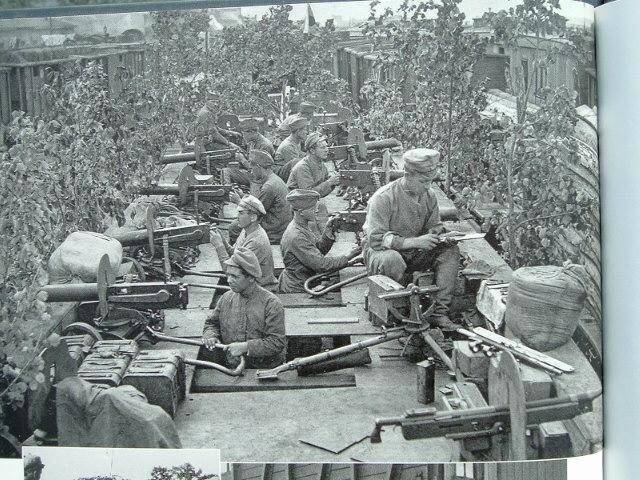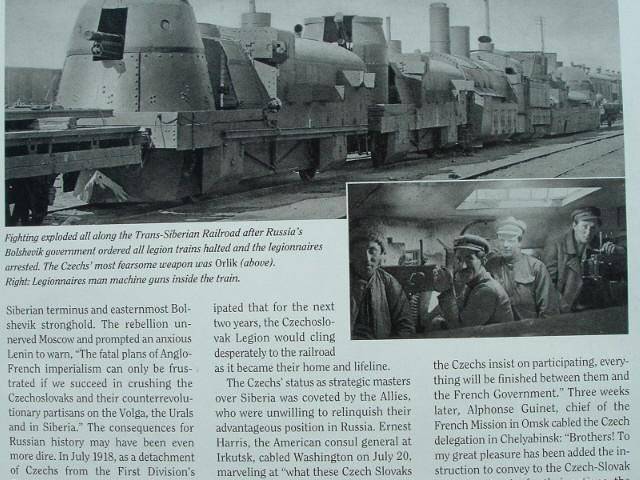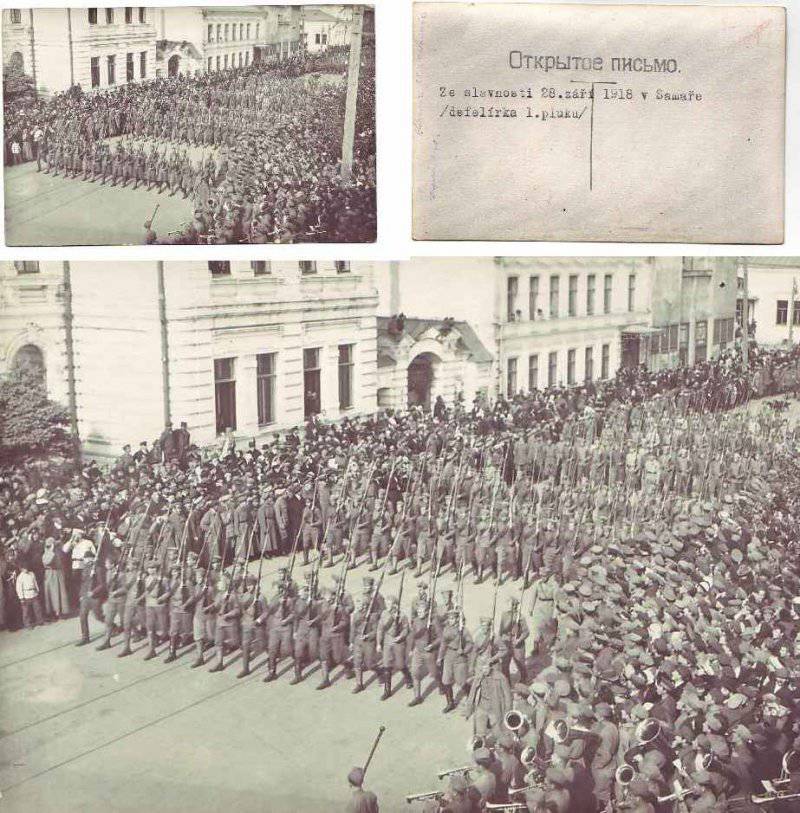West against the Russians: the uprising of the Czechoslovak Corps. Part of 2

In the autumn of 1917, the Czechoslovak Corps was located on the re-formation in the rear of the South-Western Front on the territory of Ukraine. After the October Revolution, the leadership of the Czechoslovak National Council declared the unconditional support of the Provisional Government and concluded an agreement with the command of the Kiev Military District and the South-Western Front on the use of Czechoslovak connections. On the one hand, the Czechoslovak leadership reported non-intervention of the corps into an armed struggle inside Russia on the side of any political group, on the other hand, the desire was declared “to help by all means preserve everything that contributes to the continuation of the war against our enemy - Austro-Germans”. This led to the fact that already at the end of October the Czechoslovak units, together with the junkers of the Kiev military schools, fought with the workers and soldiers - supporters of the Kiev Soviet.
The Czechoslovak National Council began to ask the French government to recognize all Czechoslovak units as part of the French army. Tomash Garrigue Masaryk did a lot of work to create the structures of the future independent Czechoslovakia and in 1917 he established contacts with almost all the “leaders” of the February revolution. In December 1917, the corps was declared an autonomous part of the French army. The French government issued a decree on the organization of an autonomous Czechoslovak army in France. Financially, the Czechoslovak Corps depended on France and the Entente. Thus, external forces interested in the collapse of the Russian statehood got into their hands a powerful military unit on the territory of Russia. And as the Russian armed forces collapsed, its value only increased.
The Czechoslovak National Council initially abstained from any action against the Soviet government. The corps refused to help the Central Rada against the Soviet troops. In February, 1918, Masaryk concluded an agreement on neutrality with M. A. Muravyov, the commander of the Soviet forces advancing on Kiev. The Soviet government as a whole did not object to the departure of Czechoslovak units to France. In the Czechoslovak parts even allowed Soviet agitation. But the result was insignificant - only a small group left the corps and joined the international brigades of the Red Army. There were ideas to use the Czechoslovak Corps in the Don area, where the generals M. V. Alekseev and L. G. Kornilov, as well as one of the leaders of the liberals, P. N. Milyukov, wanted to transfer to Czechoslovakia. The corps was to create the conditions necessary to protect the Don from the red forces and the organization of the Volunteer Army. At the same time, Masaryk established close ties with a number of revolutionary leaders. Russian officers were gradually removed from command positions.
The shortest and most optimal way to evacuate the corps was through Arkhangelsk and Murmansk. However, it was abandoned, allegedly because of fear of the German underwater fleet. They decided to send the Czechoslovak legionnaires a longer way - along the Trans-Siberian Railway to Vladivostok, and from there through the Pacific Ocean to France. When the Brest Peace was signed in March 1918 and German-Austrian troops began to enter Ukrainian territory, the Czechoslovak Corps retreated through Kiev to the Penza region. March 26, 1918 in Penza, representatives of the Soviet government (Stalin) and the Czechoslovak National Council, the Czechoslovak Corps signed an agreement on the unhindered sending of corps from Penza to Vladivostok. The Czechoslovak corps was supposed to move not as a single combat unit, which violated the sovereignty of Soviet Russia, but divided into groups of free citizens with a certain number of weapons for self defense. The Soviet government promised the Czechoslovak every assistance on its territory, with their loyalty. March 27 in the order for the body was reported on the number of weapons for self-defense: in each echelon formed an armed company of 168 people with one machine gun, for each rifle 300 charges were allowed, on the machine gun 1200 charges. The rest of the weapons surrendered to a special commission. The artillery park was mainly transferred to the Red Army when the corps was transferred from Ukraine to Russia.
The terms of this agreement are quite clear. The Soviet government did not want to have an armed unit on its territory, which was subordinated to external forces. At the same time, they didn’t want to spoil relations with their former allies, all conditions were created for the peaceful evacuation of a military unit. However, the withdrawal of the Czechoslovak Corps from Russia did not suit either certain external forces or the internal “fifth column” that Trotsky represented. They needed a full-scale civil war in Russia, and not a quick establishment of Soviet statehood, which inherits all the major achievements of the Russian Empire. It is also necessary the fate and the fact that by the time of the uprising of the Czechoslovak Corps, let me remind you - he was completely dependent on France and the Entente, the Western powers had already made a decision in principle to support anti-Bolshevik forces and intervention. At the end of November 1917, the meeting of the heads of government of Great Britain, France and Italy recognized the Transcaucasian governments. On December 22, a conference of representatives of the Entente countries in Paris decided to maintain contacts with the anti-Bolshevik governments of Ukraine, the Cossack regions, Siberia, the Caucasus and Finland. And also to support them from the financial side. December 23 an agreement was reached between France and England on the division of spheres of influence in Russia. In March, 1918, the British landing force drove in Murmansk. Planned seizure and other strategic ports.
By the end of May 1918, the Czechoslovak Corps connections stretched from Penza to Vladivostok: in the Penza-Syzran-Samara areas, 8-thousand were located. Chechek grouping; in the area of Chelyabinsk - Miass - 9 thousand Wojciechowski group; Novonikolayevsk - Art. Taiga - 4,5 thousand Guyda squad; in Vladivostok - 14 thousand grouping under the authority of Diterikhs. In addition, the Czech troops were located in the area of Petropavlovsk - Kurgan - Omsk. The moment was perfect for rebellion. The Czechoslovak Corps occupied the most important strategic communication linking the European part of Russia with Siberia and the Far East. In fact, it was one artery through the entire vast expanse of Siberia. Czechoslovak troops stood in the most important cities of Russia - from the Volga to the Pacific Ocean. At this point, the Czechoslovak Corps was almost the only combat-ready force in Russia, its strength reached 50 thousand bayonets. By the summer of 1918, the former royal army had already completely decayed and collapsed. The Red Army was just being formed and its combat capability was low. The White Army was in its infancy. We should not forget about the plans of the interventionists in the division of Russia. The United States and the “financial international” drew to Siberia with Transsib. After the Civil War, with the complete suppression of the Russian resistance, Siberia and the Siberian Railway were supposed to be prizes of the American financial oligarchy. And the Czechoslovak Corps was assigned the role of security and punitive tools. Therefore, he and evacuated only after it became clear that Soviet Russia survived.
Czechoslovakia in Samara.
But for the uprising needed a provocation. On the whole, the Czechs wanted to get to Europe without lingering in Russia. This provocation was quickly invented. If the trains were moving east with the Czechoslovakians, then German and Hungarian prisoners from East Siberia were carried west. And to put it mildly they did not like each other. Hungarians and Germans rightly considered the Czechs as traitors, and the Czechs - the Germans and Hungarians, the oppressors. Moreover, the Germans and Hungarians were given the "green light", their trains were allowed in the first place, the Czechs were driven into dead ends, they stood idle on the siding. People's Commissar for Foreign Affairs Chicherin, at the suggestion of the German ambassador Mirbach, even sent a telegram to the Krasnoyarsk Soviet to suspend the further movement of the Czechoslovak trains to the east.
Skirmishes between the Czechs and the Red Guards, with former German-Hungarian prisoners of war joined them. In Chelyabinsk, the Czechs, freeing their arrested comrades, disarmed the local Red Guard detachment and seized an arsenal with 2800 rifles and an artillery battery. The order of Lev Trotsky from 25 May immediately followed, which became the reason for the large-scale uprising: “Every Czechoslovakia who are found armed on the railway line must be shot on the spot, every train that at least one armed person will be thrown out of cars and imprisoned in a camp for prisoners of war. " The order is called "unreasoned and short-sighted," but given the role of Trotsky in the Revolution in Russia, his relationship with the world "financial international", as well as his highly sophisticated mind, this is clearly not a mistake. This order was a conscious provocation. Trotsky was a conductor of the interests of the "world behind the scenes" and fulfilled their order. In Russia, it was necessary to kindle a full-scale civil war that would bleed the Russian people and throw it to the side of the world historical process. The Russians themselves "pulled" the beginning of the war, all conflicts, insurrections, uprisings were insignificant, did not lead to much blood. It was necessary to "help".
The 16-20 of May also hosted a congress of Czechoslovak military delegates in Chelyabinsk, which established the Provisional Executive Committee of the congress of the Czechoslovak army, which included Chechek, Gayda, Voitsekhovsky and Pavel. Czechoslovak delegates came against the surrender of weapons (three rearguard regiments in the Penza region had not yet surrendered their weapons), they took the position of a break with the Soviet government and following “their own order” to Vladivostok. The Provisional Committee sent an order to all echelons and formations: “Do not surrender the weapons anywhere to the Soviets, do not cause any clashes, but in the event of an attack, defend yourself, and continue eastward by your own order.” Clashes broke out between the Red Guard detachments, which tried to disarm the legionaries, and the Czechoslovakians. The Czechoslovak Corps defeated the Red Guard detachments and captured several cities. On June 8, in Samara captured by the Czechoslovakia, the first anti-Bolshevik government was created - the Committee of the members of the constituent assembly (Komuch), and on June 23 - the Provisional Siberian Government was established in Omsk. Thus, the uprising of the Czechoslovak Corps marked the beginning of the creation of anti-Bolshevik governments throughout Russia. Trotsky's provocation was a success. The Civil War flared up throughout Russia.
It should be noted that after the uprising, the corps could easily proceed to Vladivostok on its thousands of cars with loot. The Red Army simply did not have the strength to stop this mass of troops. However, they remained. Their owners needed the Czechoslovak Corps to remain on the Trans-Siberian Railway. As a result, the Czechs "went home" for three years. We must not forget the fact of the supply of the Czechoslovak Corps (actually already the army). We remember that the White armies constantly experienced difficulties with the supply of weapons, ammunition, ammunition, etc. The Czechs did not have such problems, because de facto they were the expeditionary force of the Entente and the USA in Russia. They even put the latest American armored train, with which they completely blocked the Trans-Siberian Railway. Therefore, the white parts of Kolchak were forced to retreat along the taiga, not the road. They had no chance against Czech power - the latest armored trains with rapid-fire cannons on rotating towers. To fight such monsters, long-range artillery was needed, which the whites did not have.

The Czechoslovak Corps itself gradually emerged from the front ranks of the opponents of the Soviet regime, and in the fall of 1918, Czechoslovak units began to be relegated to the rear. At the same time, the corps continued to control the Trans-Siberian Railway and completely left the territory of Russia only in 1920. The actual owners of Transsib were beaten by representatives of the Entente. It should also be noted that the Czechoslovak Corps became an instrument of pressure on the Kolchak army and the Czechoslovak forces played an extremely unattractive role. The time of the retreat of Kolchak troops from Western Siberia to the east at the end of 1919 - the beginning of 1920. They interfered with the retreat of the white troops, occupying the railroad, and gave Kolchak a massacre. Without the Trans-Siberian Railway, Kolchak's army was isolated without any prospect, losing the opportunity for maneuver. In addition, the Czechoslovakians "distinguished themselves" in the plunder of Russia, even during the indiscriminate flight of the civilian population to the east, they managed to take away locomotives, fuel and property from refugees. Given the harsh winter conditions, on their conscience thousands of people who died from the cold. In addition, the corps received a share of the gold reserves of the Russian Empire, apparently, as a reward for its role in the unleashing and during the Civil War in Russia. This gold and the valuables stolen in Russia became the basis of the “independent” Czechoslovak state created on the ruins of the Austro-Hungarian Empire.
Unfortunately, about this unsightly and bloody page stories The civil war in Russia is now almost forgotten. Since 2000-s in Russia there have been several events aimed at perpetuating the memory of the Czechoslovak Corps, sticking out its role in the struggle against the Central Powers and the Bolsheviks. The history of the Czechoslovak Corps is described in positive colors. The memory of the corps as an instrument of the western invaders and interventionists is being lost. Monuments to Czechoslovak legionnaires, actually invaders invaders, opened in Krasnoyarsk, Buzuluk, Yekaterinburg, Nizhny Tagil, Chelyabinsk. The Czech Ministry of Defense plans to supply and upgrade several dozen monuments to Czechoslovak legionaries who fell in Russia in the battles of the First World and Civil War. We see a similar loss of historical memory in relation to the Great Patriotic War: memorable signs to German, Hungarian and other enemies are increasingly appearing on the territory of Russia.
Looting of the Czechs. According to the general of the Kolchak army, Konstantin Sakharov, “Czech legions in Siberia. Czech betrayal "
The biggest trophy of Czech compounds is part of the empire's gold reserve, 414 million. 254 thousand gold rubles. It was a huge sum for those times. In particular, J. Schiff gave Trotsky a revolution 20 million dollars. During the seizure of cities, the Czechoslovakians plundered everything that came to hand. They carried away literally everything, from medicines to books and objects of art. For three years and such a robbery, the Czechoslovak army has accumulated enormous wealth. Some drugs were robbed on 3 million gold rubles, and rubber on 40 million rubles gold. The Czechs seized 20 thousand cars and many locomotives, where they kept their wealth. They even beat off one car with gold rubles from the whites and another 8 million rubles in gold from General Sketpetrov when they attacked his train in Irkutsk. And before leaving Irkutsk, they gutted the building of the state bank, taking away all the machines printing money. On the way to Vladivostok, banknotes were printed all the way.
As a wild horde of Czechoslovakia robbed all the trains along the way. Locomotives were taken in their favor. As a result, all railway traffic in Siberia was paralyzed. Russian trains with the wounded, children, women could not move from the Czech corps. The winter of the year, 1918, was approaching, and they could not get anywhere, as did warm clothing, food and medicine. As a result, tens of thousands of Russians, hungry, robbed, half-dressed, sick and wounded, were left to die along the railroad.
The Czechs considered themselves to be full masters of the situation in Siberia. In Khabarovsk, they grabbed a German orchestra and whipped it. When the Russians wanted to reason with them, saying that the Germans were here from the Red Cross, they were asked to shut up until they were shot. German musicians were asked: "Who wants to be a Czech?" In response, silence. All Germans were shot. Such incidents were commonplace. Therefore, the Russians hated the Czechs, called them "Czechs". Before sailing to the Czech general Syrov, commander of the Czech army, soldiers and commanders of the Izhevsk and Votkinsk regiments sent 30 silver coins, "thirty pieces of silver, as the price for blood and treason."
Former half-starved Czech prisoners of war returned to the Czech Republic heroes. They were simply overloaded with various jewels, gold, silver, objects of art. Calculate the damage that the Czechoslovak Corps brought to Russia is impossible. These are many hundreds and hundreds of millions of rubles in gold, even without a part of the imperial gold reserve. With these enormous riches, the Czechoslovak legionaries established their own vault bank, where there were safes for all legionnaires. The building consisted of several massive buildings with numerous steel safes. Its initial capital amounted to 70 million kroons in gold. These are the “heroes” in modern Russia who began to erect monuments.

Information